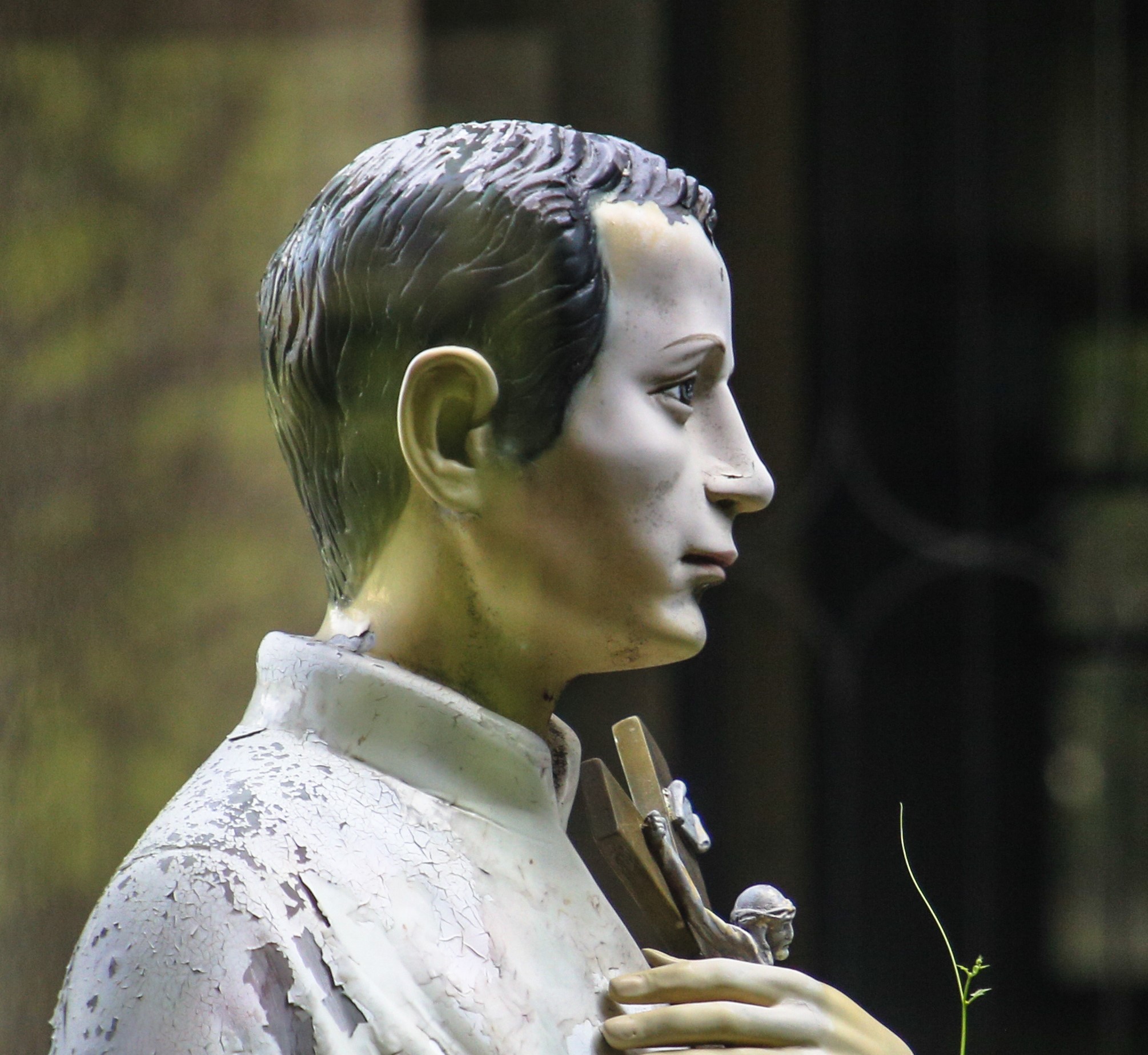“The chance to become a Saint is offered me only once. If I do not profit by it, it is gone forever. “
-St. Gerard Majella
Below is an excerpt taken from a classic TAN biography entitled St. Gerard Majella by Fr. Edward Saint-Omer, CSSR. This easy-to-read book was based on an Italian work from 1893, produced on the occasion of the saint’s beatification that same year.
St. Gerard Majella has long been a favorite “modern” saint for many. Since his canonization in 1904, his popularity has grown in Italy and beyond. He has been acclaimed by many as a “wonder-worker,” and he is well-known as the patron of expectant mothers. He is remembered as a powerful intercessor in heaven for both children and mothers. In his native Italy they have a saying: “Before there was Padre Pio, there was St. Gerard.” In fact, Padre Pio had great devotion to the memory and heavenly intercession of St. Gerard Majella.
Even in life before his death of tuberculosis at age twenty-nine, St. Gerard was famous for his miracles, cures, charities, ecstasies, mortifications, prayers, purity, obedience, zeal for souls, discernment of spirits, penetration of hearts, infused knowledge, prophesies, knowledge of distant events, bilocations, and power over nature and human hearts.
A brief excerpt of the biography follows below with insightful quotations, giving a glimpse of the saint’s holiness and eagerness to lead a saintly life despite a life of suffering:
Hope proceeds from faith as the stem from the root. The deeper the root of faith, the stronger will be the stem of hope. A soul so filled with faith as was Gerard must necessarily be animated with great hope and a truly filial confidence in God. Once he was asked whether he had certain hope of his eternal salvation. “Yes,” he answered, “since it was to obtain this favor for me that Jesus came upon earth.”
He hoped firmly, not only to attain Paradise, but even the highest sanctity. Thus this word so often on his lips: “I wish to become a Saint.” At no period of his life did he not cause to pursue this noble end so worthy of a generous soul. He aimed at it with courageous ardor and most admirable perseverance. He omitted no proper means for reaching perfection: continual prayer, frequent Communions, cruel penances, a passionate seeking after suffering, the perfect renunciation of all earthly things and unreserved surrender of self to Jesus and Mary. In the farewell letter he addressed to his mother when he withdrew from her maternal care in order to embrace the religious life, we read these words: “I am going to become a Saint.” In spite of the thousand difficulties raised by superiors against his entrance into the Congregation, he hoped against all hope. He knew by the constancy of his prayers how to gain the favor which seemed irrevocably denied.
Once admitted, Gerard put no bounds to his desires for spiritual advancement. In his resolutions, we find them thus expressed:
“The chance to become a Saint is offered me only once. If I do not profit by it, it is gone forever. Since I can have only once the good fortune to become a Saint, what shall hinder me from laboring for that end? I have every opportunity to sanctify myself. Yes, I will be a Saint.”
Knowing that the work of sanctification demands both the help of God and the cooperation of man, Gerard formed strong and serious resolutions, but he counted only on the grace of God to observe them faithfully.
“Never have I depended on myself, never will I depend upon myself! Knowing my profound misery, I would never depend on myself. If I ever did so, I was certainly out of my mind. In God, in God alone do I confide, do I hope. I have placed my whole life in His hands, that he may do with me what he pleases. And although I live, yet I am without life, since my life is God. In Him alone I rest. From Him alone I expect the help necessary to carry out my resolutions.”
To obtain this fidelity, the humble religious offered to God this prayer:
“Grant, O Lord, that I may be faithful to my resolutions. Alas! I cannot depend upon myself, incapable as I am of fulfilling the least commitment. But I confide in Thee alone, Who art Good ness and infinite Mercy and Who cannot fail in Thy promises. O Supreme Goodness, when I failed, the failure was on my side! Henceforth I desire Thee to act in me. Grant, O Lord, that I may keep my resolutions exactly and without fault. I firmly hope for this from Thee, O Thou inexhaustible Treasure!”
The saintly brother also confided in the help of the Blessed Virgin, the Angels and the Saints.
“And thou, Immaculate Virgin Mary, my only joy, be thou my protectress and my consoler! Be ever my advocate with God, that I may put into practice my good resolutions.”
“I turn to you, O blessed inhabitants of Heaven, and I beg you to be my advocates with our Creator. It is in your presence that I write these lines. Deign to read them from the heights of Heaven, and pray the Divine Majesty that I may be faithful to them. May your prayers be efficacious! It is in your presence that I make these promises to God and to Mary. I beg my holy patronesses, Teresa, Mary Magdalen of Pazzi and Agnes to give me their special and continual help.”
When the terrible trials to which he was subjected arose, Gerard showed that his hope in God was as unshaken as the rock lashed by the tempest. Like all the Saints, he had to pass through the crucible of tribulations, aridity, agony and terror. We tremble when we think of the combats against the rage of Hell that he had to sustain, the bitterness he had to experience when the most atrocious calumnies were launched against him, and the unceasing violence he had to do himself, to lead (until death) a life so mortified, so penitential. Supported by God, he never yielded to discouragement. With St. Paul, he exclaimed: “I can do all things in Him who strengtheneth me.” (Phil. 4:13).
God himself wished to rejoice in the beautiful spectacle of this heroic virtue by delivering His servant to unspeakable abandonment. Yes, this pure soul, so rich in heavenly gifts, so favored with ecstasies and seraphic ardors, had to sustain a terrible struggle against despair and the fear of being abandoned by God. He himself reveals this painful martyrdom in his letters, from which extract the following passages:
“Divine Justice tortures me in such a way that I think no one has more to suffer. May the will of God be eternally blessed! What makes me tremble and causes me the greatest fright is the thought that I shall not persevere. I behold myself in total weakness, plunged in an ocean of confusion and suspended, as it were, above the abyss of despair. It seems to me that there is no longer any God for me, that His divine mercies are exhausted and that only His Justice is hanging over my head. Behold the unhappy state in which I am! I am nailed to the Cross. Heave compassion on my agony. My tears almost prevent my writing these lines. My sufferings are so bitter that they make me experience the agonies of death.”
In the midst of these waves of affliction, the holy Redemptorist supported himself by heroic confidence.
“May God be forever blessed for the graces with which He has laden me! Instead of allowing me to die under His blows, He sustains me that I may live. If He sends me these trials, it is only that I may imitate the Divine Redeemer. He is my Master: I am His disciple. I must, then, learn to walk in His footsteps. With Him am nailed to the Cross, plunged in affliction, a prey to untold sufferings. I feel as if a lance were piercing me with a deathblow. Not to resist the designs of my Savior, who wants to nail me like Himself to the Cross, I incline my head and repeat: ‘Yes, it is the will of God whom I love. Yes, I accept, I embrace it.’”
These words recall the utterance of the Royal Prophet: “Though He should lay me, yet will I hope in Him.” God never abandons His servants in their afflictions.
This article is taken from a chapter in St. Gerard Majella which is available from TAN Books.








